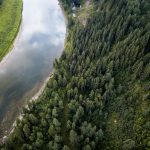 July 30, 2018 4:57 am
Published by Climate Extremes
July 30, 2018 4:57 am
Published by Climate Extremes
A new study by CLEX researchers using observations from FLUXNET sites identifies regions of high and low predictability and will likely help improve land surface model evaluation.
 July 11, 2018 11:53 pm
Published by Climate Extremes
July 11, 2018 11:53 pm
Published by Climate Extremes
This research suggests some trees and in particular, Australian trees, may be more resilient than expected to future warming and extreme events. These findings have implications for planning around which species to plant in “green cities” to help mitigate future climate extremes.
 July 10, 2018 1:19 am
Published by Climate Extremes
July 10, 2018 1:19 am
Published by Climate Extremes
Asthmatics and those affected by polluted environments living around major cities along Australia’s east coast could find life much harder over the next 50 years as stronger inversion layers caused by climate change trap more pollution.
 April 30, 2018 1:59 am
Published by Climate Extremes
April 30, 2018 1:59 am
Published by Climate Extremes
Centre of Excellence researchers have identified 12 marine heatwave types off the east coast of Tasmania, a location recognised as a global warming hotspot. Here the average sea surface temperatures here have been rising at four times the global average and trends in marine heatwaves are showing significant increases in number.
 April 9, 2018 6:30 am
Published by Climate Extremes
April 9, 2018 6:30 am
Published by Climate Extremes
An international study in Nature Communications co-authored by researchers from the ARC Centre of Excellence for Climate Extremes (CLEX) and the Institute of Marine and Antarctic Studies (IMAS) reveals globally marine heatwaves have increased over the past century in number, length and intensity as a direct result of warming oceans.
 April 1, 2018 12:07 am
Published by Climate Extremes
April 1, 2018 12:07 am
Published by Climate Extremes
New research published in Nature Geoscience has found that climate engineering that modifies the properties of the land surface in highly populated areas and agricultural areas over North America, Europe and Asia could reduce extreme temperatures there by up to 2-3°C.
 March 7, 2018 5:16 am
Published by Climate Extremes
March 7, 2018 5:16 am
Published by Climate Extremes
The reduction in growth of plants restricted by limitations on nutrients, temperature and/or water stress, didn't just reduce photosynthesis but led to negative feedbacks in plant carbon balance processes.
 February 23, 2018 5:04 am
Published by Climate Extremes
February 23, 2018 5:04 am
Published by Climate Extremes
When researchers compared the results derived from FLUXNET data with the results synthesised from the literature, they found substantial differences.
As a result, they suggest a new benchmarking metric that could be used to test existing hypotheses embedded in climate models and have mapped a path forward involving using further detailed observations to improve the way coupling/decoupling processes currently represented in climate models.
 February 23, 2018 4:21 am
Published by Climate Extremes
February 23, 2018 4:21 am
Published by Climate Extremes
This study explored the key sources of uncertainty when scaling leaf-level understanding of water-use efficiency to ecosystem scales. The results provide key insights into interpreting (ecosystem-scale) eddy-covariance derived water-use efficiency in an ecophysiological context.
 February 23, 2018 3:19 am
Published by Climate Extremes
February 23, 2018 3:19 am
Published by Climate Extremes
This paper combines existing global evapotranspiration estimates to create a new global product with an observationally constrained estimate of uncertainty. It utilises the latest release of ground-based estimates to show that even point-based evapotranspiration estimates have information about much larger spatial scales.










